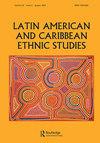Unveiling Latin American White multiculturalism: Black women’s politics in Argentina and Costa Rica
IF 1
Q4 ETHNIC STUDIES
引用次数: 1
Abstract
ABSTRACT This article proposes theoretical and methodological approaches to researching Whiteness in two countries that embraced Whiteness over mestizaje and adopted ‘late multiculturalism’: Costa Rica and Argentina. We situate our analysis within critical race and Black feminist frameworks, which argue that the construction of White identity cannot exist without the construction of racialized others and that Black women’s experiences and knowledge offer critical vantage points from which to theorize social worlds. We employ a method of juxtaposition to analyze the collision between Black women’s political initiatives and anti-Black racist responses from a White national common sense. The Costa Rican case combines participant observation with critical discourse analysis of press coverage to assess the perception of, and experience of, the first Black woman Vice President, Epsy Campbell, vis-à-vis a White gaze. The Argentinian case includes an ethnographic examination of Black women’s experiences of racism during their participation in feminist organizing. Our analysis reveals the endurance of (foundational) White national ideologies despite the deployment of ‘multicultural’ discourses. We propose the concept of ‘White multiculturalism’ to explain how White Costa Ricans and Argentines simultaneously embrace multiculturalism through progressive policies and rhetoric while maintaining investments in homogeneous Whiteness through everyday institutional and interpersonal practices and interactions.揭露拉丁美洲白人多元文化主义:阿根廷与哥斯大黎加黑人女性政治
摘要本文提出了研究两个国家白人的理论和方法论方法,这两个国家接受白人而不是梅斯蒂扎耶,并采用了“晚期多元文化主义”:哥斯达黎加和阿根廷。我们将我们的分析置于批判性种族和黑人女权主义框架内,这些框架认为,如果没有种族化他人的构建,白人身份的构建就不可能存在,黑人女性的经历和知识为社会世界的理论化提供了关键的有利位置。我们采用并置的方法,从白人的国家常识出发,分析黑人女性的政治倡议与反黑人种族主义反应之间的冲突。哥斯达黎加的案例将参与者观察与对新闻报道的批判性话语分析相结合,以评估第一位黑人女性副总统Epsy Campbell对白人凝视的看法和经历。阿根廷人的案例包括对黑人妇女在参与女权主义组织期间遭受种族主义经历的民族志研究。我们的分析揭示了尽管部署了“多元文化”话语,但(基本的)白人民族意识形态的持久性。我们提出了“白人多元文化主义”的概念,以解释哥斯达黎加白人和阿根廷人如何通过进步的政策和言论同时接受多元文化主义,同时通过日常的制度和人际实践和互动保持对同质白人的投资。
本文章由计算机程序翻译,如有差异,请以英文原文为准。
求助全文
约1分钟内获得全文
求助全文
来源期刊

Latin American and Caribbean Ethnic Studies
Social Sciences-Cultural Studies
CiteScore
1.30
自引率
16.70%
发文量
22
 求助内容:
求助内容: 应助结果提醒方式:
应助结果提醒方式:


